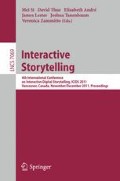Abstract
Engagement in interactive experiences is a complex, multi-dimensional concept that can be determined by a variety of factors which are dependent on user preferences and media content. However, one fundamental requirement of any interactive experience is the desire to continue the experience, and this study is concerned with investigating engagement in interactive narratives by focusing on this aspect. In the present approach, engagement is described as the user’s desire to continue an activity in order to accomplish an objective while experiencing affect. In order to investigate engagement during run time, this description is used as a foundation for formulating an intrusive method and the Engagement Sampling Questionnaire. The application of the method and the questionnaire is exemplified by an investigation of continuation desire in the experiential learning scenario, “The First Person Victim”, where participants experience a non-pleasant emergent narrative concerned with being a victim of war.
Access this chapter
Tax calculation will be finalised at checkout
Purchases are for personal use only
Preview
Unable to display preview. Download preview PDF.
References
Zagalo, N., Louchart, S., Soto-Sanfiel, M.: Users and Evaluation of Interactive Storytelling. In: Aylett, R., Lim, M.Y., Louchart, S., Petta, P., Riedl, M. (eds.) ICIDS 2010. LNCS, vol. 6432, pp. 287–288. Springer, Heidelberg (2010)
Sweetser, P., Wyeth, P.: GameFlow: A Model for Evaluating Player Enjoyment in Games. In: Computers in Entertainment (CIE), vol. 3(3). ACM, New York (2005)
Poels, K., de Kort, Y., Ijsselsteijn, W.: “It is always a lot of fun!”: exploring dimensions of digital game experience using focus group methodology. In: Proceedings of the 2007 Conference on Future Play, pp. 83–89. ACM, New York (2007)
Brown, E., Cairns, P.: A Grounded Investigation of Game Immersion. In: CHI 2004 Extended Abstracts on Human Factors in Computing Systems, Vienna, Austria, pp. 1297–1300. ACM, New York (2004)
Csikszentmihalyi, M.: Flow: The psychology of optimal experience. Harper Collins Publishers, New York (1991)
Lombard, M., Ditton, T.: At the heart of it all: The concept of presence. Journal of Computer-Mediated Communication 3(2) (1997)
IJsselsteijn, W., van den Hoogen, W., Klimmt, C., de Kort, Y., Lindley, C., Mathiak, K., Poels, K., Ravaja, N., Turpeinen, M., Vorderer, P.: Measuring the experience of digital game enjoyment. In: Proceedings of Measuring Behavior 2008, Maastricht, pp. 88–89 (2008)
Vermeulen, I.E., Roth, C., Vorderer, P., Klimmt, C.: Measuring User Responses to Interactive Stories: Towards a Standardized Assessment Tool. In: Aylett, R., Lim, M.Y., Louchart, S., Petta, P., Riedl, M. (eds.) ICIDS 2010. LNCS, vol. 6432, pp. 38–43. Springer, Heidelberg (2010)
Przybylski, A.K., Rigby, C.S., Ryan, R.M.: A Motivational Model of Video Game Engagement. Review of General Psychology 14(2), 154–166 (2010)
Pagulayan, R.J., Keeker, K., Wixon, D., Romero, R.L., Fuller, T.: User-centered design in games. In: Jacko, J.A., Sears, A. (eds.) The Human-computer Interaction Handbook, pp. 883–906. L. Erlbaum Associates Inc., Hillsdale (2003)
Davis, J.P., Steury, K., Pagulayan, R.: A Survey Method for Assessing Perceptions of a Game: The Consumer Playtest in Game Design. Game Studies – The International Journal of Computer Game Research 5(1) (2005)
Schoenau-Fog, H.: The Player Engagement Process – An Exploration of Continuation Desire in Digital Games. In: Think Design Play: Digital Games Research Conference, Utrecht School of the Arts & DiGRA, Utrecht, Netherlands (in press, 2011)
Brown, S.L., Vaughan, C.C.: Play: How it shapes the brain, opens the imagination, and invigorates the soul. Avery Publishing Group, New York (2009)
Brockmyer, J.H., Fox, C.M., Curtiss, K.A., McBroom, E., Burkhart, K.M., Pidruzny, J.N.: The development of the Game Engagement Questionnaire: A measure of engagement in video game-playing. Journal of Experimental Social Psychology 45(4), 624–634 (2009)
IJsselsteijn, W., de Kort, Y., Poels, K.: The Game Experience Questionnaire: Development of a Self-Report Measure to Assess the Psychological Impact of Digital Games (2008) (manuscript in preparation)
Schuh, G., Gunn, D., Phillips, B., Pagulayan, R., Kim, J., Wixon, D.: TRUE Instrumentation: Tracking Real-Time User Experience in Games. In: Isbister, K., Schaffer, N. (eds.) Game Usability: Advice from the Experts for Advancing the Player Experience, pp. 237–269. Morgan Kaufmann, Burlington (2008)
Kim, J.H., Gunn, D.V., Schuh, E., Phillips, B., Pagulayan, R.J., Wixon, D.: Tracking real-time user experience (TRUE): a comprehensive instrumentation solution for complex systems. In: Proceeding of the Twenty-sixth Annual SIGCHI Conference on Human Factors in Computing Systems, pp. 443–452. ACM, New York (2008)
Csikszentmihalyi, M.: Finding flow: The psychology of engagement with everyday life. Basic Books, New York (1997)
Schoenau-Fog, H., Bruni, L., Khalil, F., Faizi, J.: First Person Victim: Developing a 3D Interactive Dramatic Experience. In: Aylett, R., Lim, M.Y., Louchart, S., Petta, P., Riedl, M. (eds.) ICIDS 2010. LNCS, vol. 6432, pp. 240–243. Springer, Heidelberg (2010)
Schoenau-Fog, H., Bruni, L.E., Khalil, F.F., Faizi, J.: First Person Victim: Using Interactive Drama and Tragedy to create Awareness about the Consequences of War. In: Meaningful Play 2010: Designing and Studying Games that Matter - Conference Proceedings. Michigan State University, East Lansing (2010)
Unity 3D, Game development tool, http://www.unity3d.com
Mandryk, R.L., Atkins, M.S., Inkpen, K.M.: A continuous and objective evaluation of emotional experience with interactive play environments. In: Proceedings of the SIGCHI Conference on Human Factors in Computing Systems, pp. 1027–1036. ACM, New York (2006)
Bateman, C., Nacke, L.E.: The neurobiology of play. In: Proceedings of the International Academic Conference on the Future of Game Design and Technology, pp. 1–8. ACM, New York (2010)
Author information
Authors and Affiliations
Editor information
Editors and Affiliations
Rights and permissions
Copyright information
© 2011 Springer-Verlag Berlin Heidelberg
About this paper
Cite this paper
Schoenau-Fog, H. (2011). Hooked! – Evaluating Engagement as Continuation Desire in Interactive Narratives. In: Si, M., Thue, D., André, E., Lester, J.C., Tanenbaum, T.J., Zammitto, V. (eds) Interactive Storytelling. ICIDS 2011. Lecture Notes in Computer Science, vol 7069. Springer, Berlin, Heidelberg. https://doi.org/10.1007/978-3-642-25289-1_24
Download citation
DOI: https://doi.org/10.1007/978-3-642-25289-1_24
Publisher Name: Springer, Berlin, Heidelberg
Print ISBN: 978-3-642-25288-4
Online ISBN: 978-3-642-25289-1
eBook Packages: Computer ScienceComputer Science (R0)

